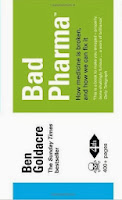Medicines have significant costs, both financial and in terms of
serious adverse effects. Treatment
should therefore only be prescribed
and continued when the benefit outweighs the risk. This presupposes that
health professionals, patients, and policymakers have trustworthy
evidence to support clinical use of medicines.
It is vital that research
on medicines is objective in order to show whether proposed treatments
are effective for improving clinically meaningful outcomes for patients,
how they compare to existing remedies, and the relative and absolute
cost implications of adopting the treatment.
In his seductive polemic Bad Pharma, psychiatrist and 'Bad Science' Guardian columnist
Ben Goldacre raises major concerns about the quality of evidence on the
efficacy and safety of specific drugs and classes of treatment in
clinical use. His book has added to recent public concern about
medicines, their safety, and the probity of pharmaceutical companies.
This background concern for the public has been inspired both by works
of fiction, for example the film Side Effects, set within a corrupted psychotherapeutic sector, and John Le Carre's African novel The Constant Gardener,
which raises important questions about the ethics of clinical research
on anti-infective agents in developing countries.
And by a
series of very large fines imposed on major pharmaceutical companies for
a wide range of reported major errors of omission and commission,
including concealed data on safety, and encouragement of doctors to
prescribe off-licence, i.e. to patient groups for whom there is no or
insufficient evidence on effectiveness or safety of medicines.
See more in reviews in the Reinvention Journal
Ben Goldacre Bad Pharma: How drug companies mislead doctors and harm patients.
London: Fourth Estate. Reprinted with edits: February 5, 2013 | ISBN-10: 0865478007 | ISBN-13: 978-0865478008

No comments:
Post a Comment